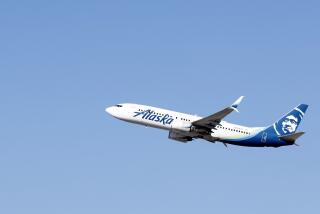FAA Reform Must Start Now
- Share via
The face and opinions of Mary Schiavo, a former inspector general for the federal Transportation Department, have been hard to miss of late. That’s because her newly published book, “Flying Blind, Flying Safe,” takes the Federal Aviation Administration to task in a way that is sure to unnerve the flying public. But how much of this is news?
Keeping track of the quality of air carrier maintenance has long been a problem. The U.S. General Accounting Office has repeatedly warned of lax inspection procedures at the FAA, and since 1993 three high-level federal commissions have recommended an overhaul of the agency.
So far that has not been done, not nearly. Now Congress is expected to devise a plan to reorganize the FAA. It’s time to put reform ideas on the table for public consideration.
For example, the FAA has spent 15 years on attempts to modernize the nation’s air traffic control system. The GAO recently referred to the project as a high-risk endeavor marked by the lack of an overall plan.
Meanwhile, the FAA claims it must depend on user fees to balance its budget, and there is little agreement in Congress on how to fund the agency in the future. Again, the lack of certainty is glaringly apparent.
The FAA, for instance, wants to allow more pilots to choose their own point-to-point routes, to phase in so-called “free flight” by the year 2012. That deserves a great deal more thought than it has received to date.
Meanwhile, the FAA still does not have enough inspectors to carry out current safety mandates, much less new ones that include tougher rules on commuter airlines to bring their standards up to those of major carriers.
Advancement in sophisticated explosives detection equipment may add to personnel needs. Given that jobs for low-wage airport luggage scanners can change hands several times a year, just who is going to operate the new equipment and how well will they do it?
And finally, despite current low accident rates, NASA officials predict that the dramatic growth of air travel could mean a major airline accident every week somewhere in the world early in the next century.
Congress and the Clinton administration have much to do to ensure that a reformed FAA is prepared to meet the increasing demands. That work ought to start now.
More to Read
Sign up for Essential California
The most important California stories and recommendations in your inbox every morning.
You may occasionally receive promotional content from the Los Angeles Times.












